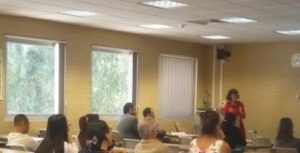“Language, Literacy, and Aboriginal English” at the 2012 ALAA Conference, Curtin University
This week, 12-14 November 2012, HARs author Marg James spoke at the Conference of the Applied Linguistics Association of Australia (ALAA) at Curtin University, Perth. After reviewing the issues and international literature on the disadvantages of second language literacy learning from countries as varied as Scandinavia, the Russian Federation, Malawi, Zambia, and the advantages of first language programs in developing countries such as the Seychelles, she asked the pertinent question on the lips of many teachers, educators, school administrators, principals and family and community members :
Can we change the situation in Australian schools?
She responded with an adapted quote by Arch Bishop Desmond Tutu,
“If you are neutral in situations of injustice, you have chosen the side of the oppressor. If a perentie has its claw on the honey sac of a honey ant, and you say that you are neutral, the honey ant will not appreciate your neutrality.”
Margaret then discussed a number of possible strategies which Prof Ian Malcolm had addressed the previous day, for taking positive action against the injustice faced by non-standard dialect speakers in Australian classrooms. Here are a few:
• Teacher preparation needs to involve recognition and training in non-standard dialect and its historical origins.
• Schools need to be supported to understand and interact with community and draw on their resources such as community storytellers or other forms of local knowledge.
• Educators and policy makers need to recognise that progression towards Standard Australian English competency will be a staged one.
Margaret gave the example of the Honey Ant Readers reading package, which is specifically designed for Aboriginal learners. The books gradually progress from AE to SAE, supporting learners along the way and draw on community resources and languages to provide a learning series that is motivating and effective in early literacy learning.

